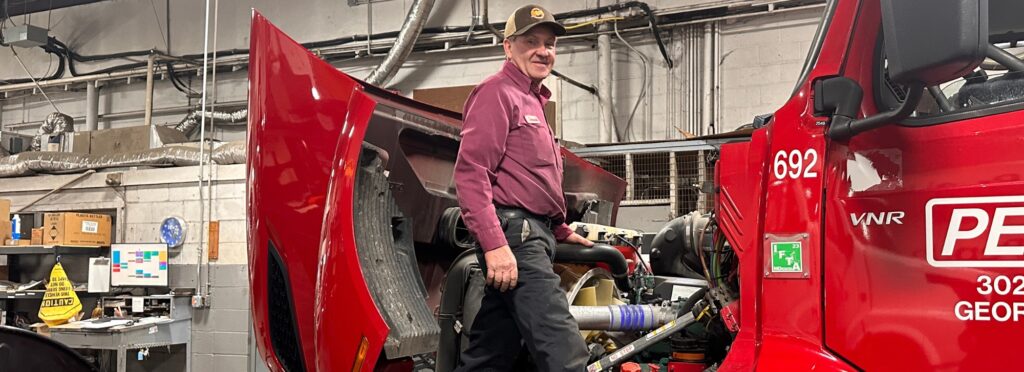Diesel mechanics specialize in the maintenance and repair of large, heavy-duty diesel engines. Below, you’ll find our resident diesel specialists’ top tips for keeping your engine happy and healthy.
#1. Prioritize Routine Maintenance with Qualified Diesel Mechanics
The best thing you can do for the longevity of any vehicle is routine maintenance. Diesel trucks are no different! Prioritizing your routine oil changes and other preventative services with a reliable, trusted diesel mechanic is paramount to a long-lasting engine. Our team at M&L have been the trusted diesel experts of Federalsburg, Maryland and beyond for several decades. Schedule your preventative maintenance services today!
#2. Change Filters Regularly
Part of your routine maintenance should be changing out old air, fuel, oil, and bypass filters. Diesel engines have 2 fuel filters, which both should be changed every 10,000-15,000 miles. New air filters can also help maintain the performance of your engine, and replacement will depend on usage and where you drive. In addition, bypass filters should be replaced roughly every 25,000 miles. Oil filters should be changed at every routine maintenance appointment.

#3. Drain Water Separators on Older Models
Older diesel engines may have water separators that need to be manually emptied. This will help avoid leaks or moisture residue which could wreak havoc on your diesel engine. Newer models will likely have automatic water releases that drain excess water from their systems. Be sure to check your make and model’s information booklet to determine which type of water separator you have.
#4. Check Fluid Levels Often
While your fluids will be topped off with routine maintenance, diesel truck drivers may want to give extra care to their fluid levels. Periodically checking that none of your oils, coolants, or other fluids are low will help prevent issues before they leave you stranded!
#5. Inspect Belts & Hoses
Similarly, diesel truck drivers should occasionally inspect their belts and hoses. Signs of wear and tear on these crucial parts should be addressed right away. Procrastinating repairs such as these can lead to breakdowns as well as worse performance of your engine over time.
#6. Use Synthetic Oil
First, determine if your engine can take synthetic oil. If your diesel engine is capable of using synthetic oil, consider making the switch. Synthetic oil can improve overall fuel economy and health of your diesel engine compared to traditional oil. If you have questions about the type of oil your diesel engine will perform best with, don’t hesitate to ask one of our team members!

#7. Let Engine Warm Up Before Driving
Letting your engine warm up, especially in the winter, is crucial. If it is 50 degrees or warmer, it should only take a minute or two to warm up. However, if it is below 50 degrees, give it at least 5 minutes to warm up. And if it’s under 0 degrees, you’ll want a full 7 minutes of warming up your diesel engine prior to taking off for the day.
#8. Let Engine Cool Down After Driving
Similarly, you’ll want to let your engine cool down between drives, too. Let your engine idle for 5-10 minutes to cool down when you park for the day. The exhaust fluid injectors need to be cooled each use to optimize their longevity. In addition, when the engine shuts off, the engine lubricant for cooling stops flowing. Turbocharger bearings depend on this to cool down, which is another reason to idle after a drive!
#9. Avoid Overloading
Never allow your load to become too heavy for your diesel engine. Besides being unsafe, overloading beyond the designated weight will also drastically decrease your fuel mileage. Additionally, you’ll want to check that you’re not carrying any unnecessary weight which could put extra strain on your engine.
#10. Choose High Quality Fuel
Lastly, one of the best decisions you can make for your diesel engine is to choose high quality fuel. In general, #1 diesel is better for winter use because it is thinner. Meanwhile, #2 diesel is thicker and more suited for summer use. Be sure to contact our parent company, PepUp, for your high quality diesel fuel needs!
Following these tips and tricks from our diesel mechanics will help extend the life of your engine and improve your fuel consumption. Rather hit the easy button? Schedule your service with our seasoned diesel mechanics below!

Meet M&L Heavy-Duty Truck Mechanic, Donald Benton
Donald Benton has worked as a trusted diesel mechanic with M&L Truck Service for 45 years. He says his favorite part of the job is the satisfaction he gets from repairing things that were broken, and getting them back to working order.
